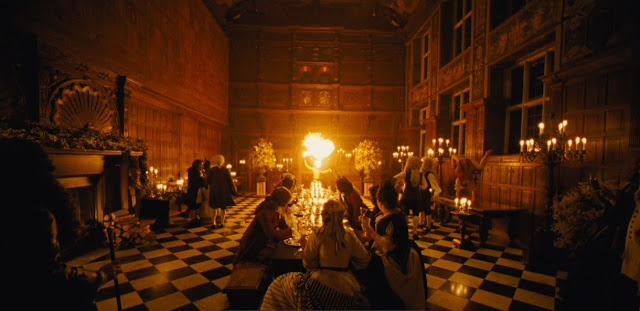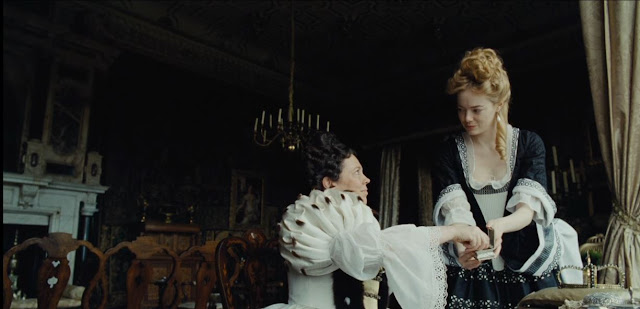Best of 2018 - Best Cinematography
I have to say, I was pretty devastated when the Academy announced they were going to move several categories to the commercial breaks this year, including quite possibly my favorite award - Best Cinematography. Luckily, pretty much everyone in the music industry revolted and the decision was reversed. The Oscars lineup this year is pretty decent, although I have not seen one of the films (Never Look Away). These, however, are my choices.
Annihilation (dp Rob Hardy)
A strange, surreal, stunning film full of haunting and unforgettable images. The nightmarish world the protagonists enter, The Shimmer, is completely immersive through the combination of production design, visual effects, and cinematography, yet always has the intangible quality of a dream. To reflect a world that has splintered and mutated, Hardy uses color palettes and camera tricks that are both beautiful and disorienting. The lighting is soft and diffuse, creating an atmosphere that is almost serene, yet wholly unsettling. Annihilation has some of the most unique and memorable cinematography in recent memory. It left me overwhelmed.
Roma (dp Alfonso Cuaron)
On the other side of the spectrum is the highly specific, realistic and yet totally magical cinematography of Roma, shot by the director Alfonso Cuaron, elevating his childhood memories and the history of his native Mexico to mythic status. His camera work here is almost obscenely good. This is one for the ages. His long, slow takes and masterful tracking shots, which have become a signature of his filmmaking, pull you in until the emotion of the scene overtakes you. The long takes in the hospital and on the beach are some of the greatest ever shot.
If Beale Street Could Talk (dp James Laxton)
Really, in any other year, this would be the most gorgeous film of the year. In some ways, it still is. It most fully embraces beauty and sensuality. The stirring intimacy of the images can't be conveyed in stills, it is something you have to see in motion. The way the camera worships the faces and the bodies of its star-crossed lovers, weaving around them, lingering on their hands, their lips, their eyes - the softness of twilight in the city, the way rain shimmers on an umbrella - it's all so lush, so lovingly gazed upon. You almost want to blush at the freshness and vulnerability of the images. There were times when my breath caught in my throat. The colors and aesthetic of the 70s are wonderfully realized here as well. The visual style is so distinct and always perfectly in step with the themes of black love and solidarity. You can't help but be drawn into the world and the inner lives of its characters through the visuals.
The Favourite (dp Robbie Ryan)
The Favourite's cinematography is as sharp as its characters' tongues. It is stark and deeply contrasted, with the costumes and production design made up of so much black and white. Bright natural light floods the characters' faces, illuminating every sneer, snivel, and tear. The nighttime scenes are warm with candlelight and flickering torches, but instead of conveying coziness, it adds to the feeling of otherwordliness - are we, perhaps, in hell, as Lady Malborough suggests? Ryan finds ingenious ways to frame his shots, framing his characters in unexpected ways to suggest their place in the narrative or their mental state, and creating a sense of dread and unease with fisheye lenses and Dutch angles. It's a striking, eerie, wholly ingenious take on the period piece.
\
The Ballad of Buster Scruggs (dp Bruno Delbonnel)
The Coens depart from their longtime collaborator Roger Deakins to work with Bruno Delbonnel, and for the very dark folktales of The Ballad of Buster Scruggs, this proves to be a fitting pairing. Delbonnel captures the American West in a number of its most iconic iterations, from the dusty plains to the splendid valleys of the Gold Rush. He's most suited to the twisted fairy tale of All Gold Canyon, which bursts with spectacular, almost Disneyfield color as the majesty of an untouched piece of the west is revealed. I'm also partial to his work on the segment Meal Ticket, a cold, Gothic piece of melancholy and cruelty. Never has the West looked so prettily bleak.
Annihilation (dp Rob Hardy)
A strange, surreal, stunning film full of haunting and unforgettable images. The nightmarish world the protagonists enter, The Shimmer, is completely immersive through the combination of production design, visual effects, and cinematography, yet always has the intangible quality of a dream. To reflect a world that has splintered and mutated, Hardy uses color palettes and camera tricks that are both beautiful and disorienting. The lighting is soft and diffuse, creating an atmosphere that is almost serene, yet wholly unsettling. Annihilation has some of the most unique and memorable cinematography in recent memory. It left me overwhelmed.
Roma (dp Alfonso Cuaron)
On the other side of the spectrum is the highly specific, realistic and yet totally magical cinematography of Roma, shot by the director Alfonso Cuaron, elevating his childhood memories and the history of his native Mexico to mythic status. His camera work here is almost obscenely good. This is one for the ages. His long, slow takes and masterful tracking shots, which have become a signature of his filmmaking, pull you in until the emotion of the scene overtakes you. The long takes in the hospital and on the beach are some of the greatest ever shot.
If Beale Street Could Talk (dp James Laxton)
Really, in any other year, this would be the most gorgeous film of the year. In some ways, it still is. It most fully embraces beauty and sensuality. The stirring intimacy of the images can't be conveyed in stills, it is something you have to see in motion. The way the camera worships the faces and the bodies of its star-crossed lovers, weaving around them, lingering on their hands, their lips, their eyes - the softness of twilight in the city, the way rain shimmers on an umbrella - it's all so lush, so lovingly gazed upon. You almost want to blush at the freshness and vulnerability of the images. There were times when my breath caught in my throat. The colors and aesthetic of the 70s are wonderfully realized here as well. The visual style is so distinct and always perfectly in step with the themes of black love and solidarity. You can't help but be drawn into the world and the inner lives of its characters through the visuals.
The Favourite (dp Robbie Ryan)
The Favourite's cinematography is as sharp as its characters' tongues. It is stark and deeply contrasted, with the costumes and production design made up of so much black and white. Bright natural light floods the characters' faces, illuminating every sneer, snivel, and tear. The nighttime scenes are warm with candlelight and flickering torches, but instead of conveying coziness, it adds to the feeling of otherwordliness - are we, perhaps, in hell, as Lady Malborough suggests? Ryan finds ingenious ways to frame his shots, framing his characters in unexpected ways to suggest their place in the narrative or their mental state, and creating a sense of dread and unease with fisheye lenses and Dutch angles. It's a striking, eerie, wholly ingenious take on the period piece.
The Ballad of Buster Scruggs (dp Bruno Delbonnel)
The Coens depart from their longtime collaborator Roger Deakins to work with Bruno Delbonnel, and for the very dark folktales of The Ballad of Buster Scruggs, this proves to be a fitting pairing. Delbonnel captures the American West in a number of its most iconic iterations, from the dusty plains to the splendid valleys of the Gold Rush. He's most suited to the twisted fairy tale of All Gold Canyon, which bursts with spectacular, almost Disneyfield color as the majesty of an untouched piece of the west is revealed. I'm also partial to his work on the segment Meal Ticket, a cold, Gothic piece of melancholy and cruelty. Never has the West looked so prettily bleak.







Comments
Post a Comment